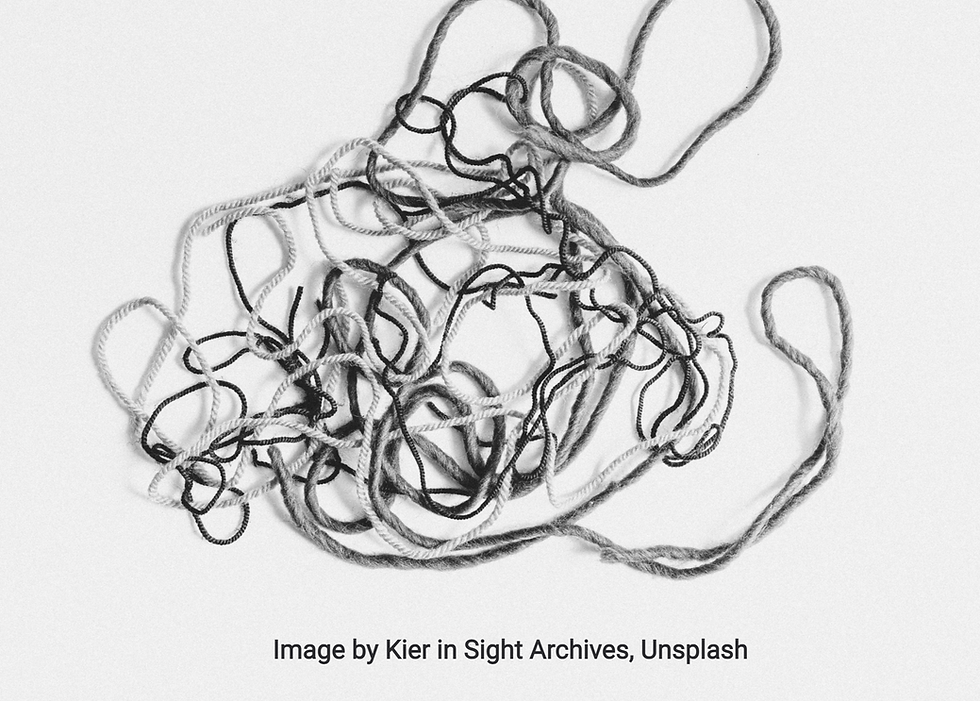Guest Blog: Dealing with Brain Drain in the Time of Covid-19
- Louise Carnachan

- May 26, 2020
- 3 min read
Updated: Jul 8, 2020
The following blog post comes from my friend, Anne Kearney, whom you might remember from an earlier post on living in small spaces. This post explores how to recognize brain fatigue and ways to restore yourself. Below is the view from her terrace in Barcelona, Spain. To read Anne's longer blog on her website, go to www.annekearneyartist.com/drawing-connections/why-am-i-so-unproductive.

Another week has gone by and, once again, I feel like I haven’t gotten much done. I am not beating myself up about it – I have definitely gotten over the feeling that I need to make the most of lockdown by upping my productivity. But there’s a difference between being a bit less productive than normal and the state of mental fatigue I found myself in about a month ago – being unable to focus, forgetting why I went into the living room, giving in to poor food choices, and generally feeling annoyed. I know I am not alone. Thankfully, although we may not be able to do much about the current crises, we can do something about our own mental fatigue.
Functioning in the world requires considerable mental effort. We have to pay attention to things that aren’t inherently interesting, consider alternatives and make decisions, and work to tamp down the voice inside us that says, “eat the chocolate.” Unfortunately, our store of mental energy can be drained over time. We are more mentally fatigued at the end of a hard day, after finishing a tough project, or after dealing with difficult people. (And not surprisingly, we are more likely to give in to the chocolate at these times.) Under normal circumstances, our mental energy is replenished through a good night’s sleep. But the circumstances we find ourselves in these days are anything but normal. It’s time to be proactive about restoring our mental energy.
According to psychologists Stephen and Rachel Kaplan, who studied mental restoration for over 30 years, one way to restore your mental energy during the day is by putting yourself in a place or situation that occupies your brain in a way that is pleasant, makes limited cognitive demands (where you don’t have to think too hard, be vigilant, or practice self-control), and leaves enough room in your mind for quiet reflection.
One thing that works for almost everyone is being in nature and this is yet another reason to get outside if you are able. Whether you are walking, running or biking, choose a route that is as “green” as possible. Put away your phone, think about foregoing the music or audiobook, and relax your mind. If you find walking stressful at the moment (like I do in urban Barcelona), other ways to enjoy the restorative power of nature might be spending time in your garden or on the terrace or even looking out the window if you have a nature view. This is what I did when I realized I had reached an alarming level of mental fatigue. After a couple days spending significant time on our little terrace enjoying the plants and bees, I felt so much better that my entire family started taking their own terrace time.
Other restorative activities might include free-writing to clear your mind, creating art or music, baking something, meditating, spending time with pets, or doing yoga. Everyone is different so what works for others may not work for you. Try some small experiments. Ask yourself if the activity allows you to get away – at least mentally – from everyday work and distractions. Is it mentally relaxing and effortless? Is there space left in your brain for problems, concerns, or other thoughts to bubble up? Allow yourself to be in that place or experience for 30 minutes or more without distractions and assess how you feel. When you find things that work for you, try to do them daily.
Is this self-indulgent? Not at all. When we invest time in topping up our mental energy, we are more efficient, less stressed, and more pleasant to be around. I keep this in mind when I take my vermouth out on the terrace in the early evening and tune out the world. I am not being selfish – I am simply engaging in the critical task of maintaining my brain power.
Anne Kearney is an environmental psychologist and artist who currently lives, writes, and makes art in Barcelona. Her work is inspired by her decades of experience studying the interactions between people and their surroundings while working for universities, non-profits and NASA. She has a B.A. in Cognitive Science from Stanford University, and a M.S. in Resource Policy and Behavior and Ph.D. in Environmental Psychology from the University of Michigan. You can find out more about her work at annekearneyartist.com.



Comments